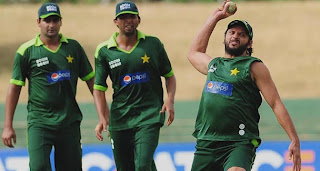The Pakistan Cricket Board has announced a new code of conduct for its players, following recommendations by the International Cricket Council.
Players must sign the new code before leaving for the upcoming one-day and Test series against South Africa, to be played in the United Arab Emirates. Pakistan's last two tours of Australia and England were beset by indiscipline and allegations of corruption.
The new code will also be applied to Pakistan domestic cricket.
National team manager Intikhab Alam, a former Pakistan captain and coach, told reporters that it would involve stricter standards of behaviour, while players would be barred from directly addressing the media.
It will also mean players being prohibited from using mobile phones and unauthorised people being barred from dressing rooms.
"The new code of conduct is the first step towards fulfilling the ICC's recommendations," explained Intikhab.
"There is a lot more stress on creating awareness among players about anti-corruption laws and regulations. We hope the new code will help us in dealing with the disciplinary and corruption problems."
The squad were briefed about their responsibilities in a 90-minute lecture during a training camp in Lahore, ahead of the South Africa series, which begins in the UAE on 26 October.
Intikhab added: "The players were briefed about corruption in the game, doping and discipline and I hope they will be responsible enough to show good conduct during the tour and in home matches.
"The board has made it clear in the new code that the manager will waste no time in stamping out indiscipline in the team. We don't want a repeat of what happened in England."
The PCB also agreed to "desist from making public comments and disclosing confidential information which undermine the integrity, reputation and image of the game and/or any ongoing disciplinary or criminal investigation" - and prove that progress was being made within 30 days, or risk further sanctions.
Pakistan's disastrous tour of Australia last winter, when they lost all three Tests and six limited-overs internationals, prompted a wide-ranging PCB inquiry, after which a number of players received bans and fines for disciplinary issues, although some have since been rescinded.
The tourists' performance down under was also investigated by the ICC's anti-corruption and security unit (ACSU).
During the summer tour of England, the cricket world was rocked by spot-fixing allegations against Test captain Salman Butt and pace bowlers Mohammad Amir and Mohammad Asif, following investigations by the News of the World newspaper, which claimed Amir and Asif had deliberately bowled no-balls to order at pre-arranged times during the Lord's Test.
Butt, Amir and Asif were provisionally suspended by the ICC, and their appeals against those bans will be held in Doha on 30 and 31 October - although a separate criminal investigation by British police is ongoing.
A second corruption row then broke out during the one-day international series, after it was revealed that the ACSU was investigating "a certain scoring pattern" during Pakistan's victory over England in the third one-dayer - although last week, the ICC announced that there was "no compelling evidence" of fixing.
PCB chairman Ijaz Butt also alleged that talk in Asian bookmaking circles was that England players had been paid to lose that match, although he later withdrew his comments following a threat of legal action from the England and Wales Cricket Board.








